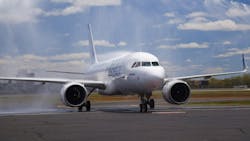Pratt & Whitney Cuts Jet-Engine Delivery Plan as Output Lags
Pratt & Whitney cut the 2016 target for deliveries of its new jet engine as the company grapples with production issues that have marred the turbine’s rollout.
The engine maker will hand over about 150 units this year, down from the 200 it previously expected, according to Greg Hayes, chief executive officer of Pratt parent United Technologies Corp. The company is working with airlines and plane manufacturers to adjust the schedule, he said.
“Nobody’s happy,” Hayes said in a presentation at a conference in Dana Point, Calif., on Friday. ““The airlines aren’t happy they’re not getting the engines. We’re not happy we’re not delivering.”*
United Technologies fell 2.4% to $100.29 at 1:15 p.m. in New York, the sharpest drop in the Dow Jones Industrial Average. The shares climbed 6.9% this year through Thursday, compared with a 5.1% gain in the Standard & Poor’s 500 Index.
Bombardier Inc. last week slashed the delivery forecast for its new C Series aircraft and blamed delays in receiving engines from Pratt. The issue was another in a series of setbacks for the engine maker over the past year, including a cooling problem inside the turbine that could affect startup times. Pratt has developed fixes for the issue.
[CHARTBEAT:3]
Critical Product
The new geared turbofan engine is critical to the future of Farmington, Connecticut-based United Technologies, which also makes Otis elevators and Carrier air conditioners. Pratt invested $10 billion over the past two decades to develop the engine, which promises dramatic cuts in fuel use, emissions and noise over previous-generation models.
Pratt is looking to challenge General Electric Co. in the global market to power narrow-body aircraft, and the two compete as options on the A320neo by Airbus Group SE. The geared turbofan is offered on several other aircraft platforms, including the C Series and Embraer SA’s newest E-jets.
The engine has about 800 parts, and difficulties with about five of those are causing problems that have slowed down production, Hayes said. In particular, the fan blades now take about 60 days to produce because of the complex technology, but that should take about 30 days, he said.
“We’re still struggling to come down the learning curve,” he said.
Pratt will deliver 350 to 400 geared turbofan engines next year as it increases production rates to account for a backlog of about 8,200 units, Hayes said.
“This is an unprecedented ramp” in production, he said. “We’ve just got to execute.”
United Technologies stuck with its long-term forecast for Pratt, which the company said would increase organic sales more than 10 percent a year through 2020. Pratt earnings won’t increase next year, Hayes said.
*Correction: Bloomberg initially misquoted Hayes. The quote has been fixed.
About the Author
Bloomberg
Licensed content from Bloomberg, copyright 2016.
